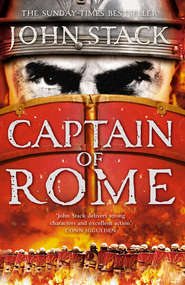По всем вопросам обращайтесь на: info@litportal.ru
(©) 2003-2024.
✖
Master of Rome
Настройки чтения
Размер шрифта
Высота строк
Поля
The men swept on but slowed as they narrowed the distance, wary of the inflexible line of shields facing them, the spear tips visible above the ranks, ready to strike forward. Eventually the advance petered out, the men forming into a ragged line a hundred yards short of the shield wall.
Atticus stepped forward from the Roman line. ‘Who commands there?’ he shouted across, and a soldier stepped forward, his hand held away from the hilt of his sword. His uniform was dust-stained and his face was creased with fatigue, but he held himself tall and he crossed the gap quickly to stand before Atticus and Septimus.
‘I am Servius Salinator,’ he said, ‘commander of the Etruscan infantry.’
‘Atticus Milonius Perennis, prefect of the fleet, and this is Septimus Laetonius Capito, centurion of the Orcus.’
The man saluted Atticus and nodded to Septimus.
‘You are part of the proconsul’s army,’ Atticus said, and Salinator nodded, his expression strained. ‘Then where are the legions?’ Atticus continued. ‘And why do you march out of formation?’
‘The Sixth and Ninth legions are no more,’ Salinator said, his voice laced with anger and shock. ‘They have been defeated, near Tunis.’
‘By the gods …’ Septimus whispered, his thoughts immediately on the men of the Ninth, the legion he had served with for so many years.
Atticus stepped forward, his mind reeling as he grabbed Salinator’s arm. ‘Come with me,’ he said, and he led him through the shield wall, leaving Septimus standing alone. The centurion gathered his wits and turned to his men. ‘Stand down the line!’ he shouted, and the order was repeated, prompting the Etruscans to move forward once more.
Septimus quickly followed Salinator as Atticus led him to the officers’ quarters overlooking the harbour. The building was deserted and the three men stepped out of the warm breeze into the cool, dark interior, Atticus’s eyes never leaving Salinator as they settled around a table. ‘What happened?’ he asked.
The Etruscan drew the back of his hand across his mouth. ‘We met the enemy on a plain south of Tunis two days ago,’ he began, his eyes, unseeing, fixed on the rough grain of the table. ‘The Carthaginians attacked first, in the centre, with elephants, at least a hundred of the infernal beasts, charging in front of their infantry.’ Salinator shook his head, ‘The legions … they just stood their ground, to a man. It was the most …’ He trailed off and Septimus straightened his back as he thought of the incredible courage.
‘We were on the left flank, facing the enemy’s mercenaries,’ Salinator continued, his face showing the disdain he felt for the hired soldiers, ‘and the cavalry was on the right. We broke through easily but the cavalry were routed. They were outnumbered, four, maybe five to one. They never stood a chance.’
‘And the centre?’ Atticus asked.
‘After our horse fled, the Carthaginian cavalry attacked the right flank and swept around the rear. Some of the hastati broke through the elephant charge, but they were swallowed by the enemy infantry, and the bulk of the legions were trapped by the cavalry. We re-engaged on the right and the proconsul broke out with maybe five hundred men, but they were isolated and surrounded again and we were pushed back, so I ordered a fighting retreat.’
‘You fled and left the legions trapped?’ Septimus said, rising to his feet, his fists balled by his side.
‘There was nothing we could do,’ Salinator replied, standing to face down Septimus. ‘If we’d stood our ground we would have been slaughtered like the legions.’
‘So you ran,’ Septimus said contemptuously, ‘and saved your own skin.’
‘Enough!’ Atticus shouted, and stood to lean between the two soldiers. He turned to Salinator. ‘Did you see the proconsul fall?’ he asked.
The Etruscan tore his eyes from Septimus and looked to Atticus, the anger in his eyes never abating. ‘No,’ he replied after a moment. ‘I think he was captured but I can’t be sure.’
‘What does it matter?’ Septimus said, turning away from the table, concern for the Ninth overwhelming him.
‘Were you pursued?’ Atticus asked.
‘I don’t think so,’ Salinator replied and, looking at Atticus, he spoke aloud a thought that had plagued him during his flight from the battle. ‘But with the legions destroyed, nothing stands between Tunis and here.’
Atticus nodded and walked from the table. Salinator sat down again, his gaze moving to Septimus, his mouth creased in anger once more.
Suddenly a clarion call of alarm sounded, followed by another and then another, until they overlapped to form a continuous sound.
Salinator shot up once more, panic in his face. ‘We were followed; the Carthaginians are attacking.’
‘No,’ Atticus said, his expression equally dread-filled, but for another reason. ‘Those are naval horns.’ He rushed to the door, pushing it open to run outside, his eyes blinking rapidly in the sunlight after the gloom of the interior. His gaze swept the seaward horizon. He felt Septimus come out to stand beside him, but his focus never left the fearsome sight that had prompted the sound of alarm from the galleys of the fleet. Atticus instinctively reached for the hilt of his sword.
‘Poseidon protect us …’ he whispered, and he broke into a run as he headed down to the shoreline, calling to the nearest galley to launch its skiff. In the distance, the dark-hulled Carthaginian galleys continued to deploy across the mouth of the harbour, their number already exceeding a hundred, the windblown waves dashing against their rams as their oars crashed endlessly into the restless sea.
Marcus Atilius Regulus straightened his back as he heard footsteps approaching the door, the proconsul drawing himself to his full height in the darkened, airless room. He stepped into one of the shafts of sunlight permitted by the shuttered window, feeling the sweat roll down his back in the infernal heat. He blinked a bead of moisture from his eye. Regulus was nearing fifty years old but his body was that of a younger man, the harsh campaigning of the previous twelve months having stripped his frame of the softness that had accumulated over many comfortable years in the Roman Senate.
He was thirsty, the meagre amphora of brackish water he had been given the night before long since gone, and he licked his lips to moisten them, conscious that his first words should not be spoken with a cracked voice. He watched the door shudder as a harsh metallic sound cut through the near silence; the room was flooded with harsh sunlight as the door was opened. Regulus squinted against the light but he resisted the urge to wipe the blindness from his eyes, instead staring directly ahead to the two figures facing him. They were both soldiers, but senior in rank, their bearing revealing the arrogance and confidence of command.
The younger man entered first. He was Carthaginian, his uniform of the style that Regulus had come to loathe over the previous months. He looked the proconsul in the eye, staring at him as if in fascination, studying him, and Regulus returned the gaze, suddenly conscious of the soiled, sweat-stained tunic he was wearing. The other man stepped in. He was taller than the Carthaginian, his skin a paler complexion, and his gaze wandered the room before settling on the Roman, a half-smile of disdain creasing the edge of his mouth.
‘You are Regulus,’ the Carthaginian said; more a statement than a question, but the proconsul nodded in reply regardless.
‘I am Hamilcar Barca,’ the Carthaginian continued. ‘And this is Xanthippus.’
Regulus held his tongue, taking the moment of silence to study the men anew. He had heard their names many times over the course of the year-long campaign – from ally and captured foe alike. Hamilcar Barca was the overall commander of the Carthaginian forces, and Xanthippus, the Spartan mercenary, hired to command their army after their overwhelming defeat at Adys over a year ago, the man who had given the enemy victory only two days before at Tunis.
‘What of my men?’ Regulus asked, speaking for the first time, his voice low and hard in an effort to instil authority in his question.
‘Sit down,’ Hamilcar replied, indicating the single chair against the far wall.
Regulus glanced over his shoulder but remained standing. He stared into the Carthaginian’s face, keeping his expression unreadable. Hamilcar stepped forward.
‘Sit down,’ he repeated menacingly. ‘Or I will have my men come in and strap you to the chair.’
Regulus hesitated a second longer and then moved slowly to the far wall, sitting down in one fluid movement as if by choice.
Hamilcar smiled, although the gesture did not reach his eyes. ‘For now your men are in the prison beneath this fortress,’ he replied, his eyes never leaving those of the proconsul’s. ‘I have not yet decided their fate.’
‘They are soldiers captured in battle,’ Regulus said, leaning forward. ‘Their lives must be spared.’
‘They are Roman,’ Hamilcar shot back. ‘And their lives are forfeit to the whim of Carthage.’
Regulus made to retort but again he held his tongue, sensing that to antagonize the Carthaginian further was to risk the lives of the five hundred legionaries who had been captured with him. He repeated the number in his mind. Five hundred out of an army of twelve thousand. He whispered a prayer to Mars, the god of war, as he struggled to keep the burden of the terrible loss hidden from his enemy.
‘You are defeated, Roman,’ Hamilcar said, as if reading Regulus’s thoughts. ‘Your army is no more and your invasion is finished.’
‘Is that why you have come here, Carthaginian?’ Regulus retorted. ‘To tell me this. To mock me?’
‘No,’ Hamilcar replied, stepping forward once more until he stood over Regulus. ‘Your light infantry escaped our grasp at Tunis and have fled to Aspis. I have come here to demand you order those forces to surrender.’
‘Surrender?’ Regulus scoffed. ‘The fleet at Aspis will already have evacuated them. There will be no surrender.’
‘You are wrong, Roman,’ Hamilcar replied, the arrogance of the proconsul stirring his anger. ‘The port is blockaded and your fleet is trapped, and if you do not order those men to surrender, I will kill every last one of them.’
Regulus was stunned into silence, his mind racing to devise an alternative.
‘You have until tomorrow to decide,’ Hamilcar said, and he turned and left the room, Xanthippus following without a backward glance.
Regulus stood up as the door was closed, the room once more plunging into semi-darkness. He breathed in deeply, trying to clear his thoughts, but the warm air caught in his throat and he coughed violently. He reached out instinctively for the amphora and picked it up, remembering immediately that it was empty, and he threw it at the wall in anger, the clay shattering into a dozen pieces.









